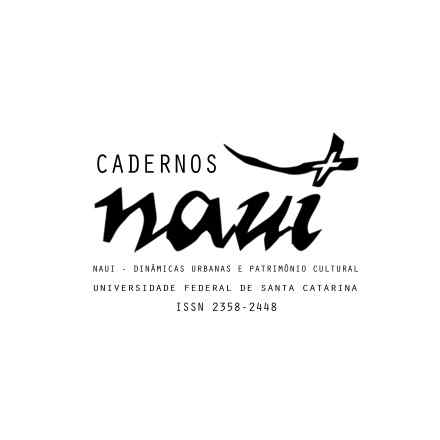DINÂMICAS CULTURAIS INDÍGENAS E SUAS RELAÇÕES COM LUGARES DE IDENTIFICAÇÃO
Cadernos NAUI
DINÂMICAS CULTURAIS INDÍGENAS E SUAS RELAÇÕES COM LUGARES DE IDENTIFICAÇÃO
Autor Correspondente: N. Z. Zanin | [email protected]
Palavras-chave: dinâmicas culturais indígenas; lugares de identificação; patrimônio imaterial
Resumos Cadastrados
Resumo Português:
O presente artigo apresenta reflexões sobre alguns posicionamentos assumidos por grupos indígenas, a partir de situações que tive a oportunidade de participar e observar. Buscarei dialogar com autores que trazem a identidade como um atributo relacional, que se refere à interação com outros, aproximando-me da argumentação sobre a identidade cultural e suas transformações, que carregam a necessidade de reconhecer as dinâmicas inerentes às vivências (inter)culturais e suas relações com lugares simbólicos que compõe o patrimônio imaterial. Também são apresentadas reflexões acerca do papel da escola indígena como instrumento para a reafi rmação de suas identidades étnicas, e a relevância dos ambientes escolares expressarem representações simbólicas com essa intenção. Para finalizar, utilizo -me dos “lugares antropológicos” de Marc Augé (1994) relacionando -os com as situações descritas, que contemplam lugares de identificação de comunidades indígenas, alguns deles presentes em memórias ancestrais, mas ainda vivos e relacionados ao seu patrimônio imaterial.
Resumo Inglês:
This article presents reflection s upon some positions undertaken by indigenous groups based on situations which I have had the opportunity to participate in and observe. I attempt to have a dialogue with authors who bring the identity as a relational attribute which refers to the interaction with others, approaching the debate about the cultural identity and its transformations, which carry along the need to acknowledge the dynamics inherent to the (inter)cultural experience and their relations with symbolic places that compose the immaterial heritage. Reflections on the role of the indigenous school as an instrument for the reaffirmation of its e thnical identities, and the relevance of the school environments to express symbolic representations with this intention are addressed as well. Finally, I make use of "anthropological places" by Marc Augé ( 1994 ) connecting them to the described situation s, which contemplate identification places of indigenous communities, some of them present in their ancestral memories, yet still alive and related to their immaterial heritage.

